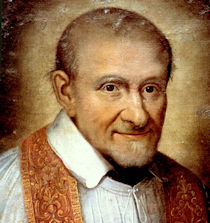Ordinary Time: September 27th
Memorial of St. Vincent de Paul, priest
Other Titles: Apostle of Charity; Monsieur Vincent
» Enjoy our Liturgical Seasons series of e-books!
St. Vincent de Paul (1581 - 1660) was born in Gascony, France, and died in Paris. He studied theology at Toulouse and was ordained a priest in 1600. As a young priest he fell into the hands of Mohammedan pirates who carried him off to Africa. After his return to France he became successively parish priest, grand almoner of the galley slaves, and spiritual director of the Visitation nuns. He founded the Congregation of the Priests of the Mission or Lazarists to preach especially to country people. With the help of Louise de Marillac he established the Congregation of the Sisters of Charity to care for young girls, for the needy, sick, and foundlings. He died at St. Lazarus's which was the center of his Congregation. Leo XIII proclaimed him special patron of charitable institutions.
According to the 1962 Missal of St. John XXIII the Extraordinary Form of the Roman Rite, today is the feast of Sts. Cosmas and Damian which is observed on September 26 in the Ordinary Form.
St. Vincent de Paul
 St. Vincent de Paul was a great apostle of charity, and brought a great revival of the priesthood in the 17th century. He was born near Dax in 1581 in the Landes (in the old Province of Gascony), France in 1581. As a young priest he was captured by Moorish pirates who carried him to Africa. He was sold into slavery, but freed in 1607 when he converted his owner.
St. Vincent de Paul was a great apostle of charity, and brought a great revival of the priesthood in the 17th century. He was born near Dax in 1581 in the Landes (in the old Province of Gascony), France in 1581. As a young priest he was captured by Moorish pirates who carried him to Africa. He was sold into slavery, but freed in 1607 when he converted his owner.
Having returned to France, he became successively a parish priest and chaplain to the galley-slaves. He founded a religious Congregation under the title of Priests of the Mission or Lazarists (now known as Vincentians), and he bound them by a special way to undertake the apostolic work of charity; he sent them to preach missions, especially to the ignorant peasants of that time, and to establish seminaries.
In order to help poor girls, invalids, and the insane, sick and unemployed, he and St. Louise de Marillac founded the Congregation of the Daughters of Charity, now better known as the Sisters of St. Vincent.
St. Vincent worked tirelessly to help those in need: the impoverished, the sick, the enslaved, the abandoned, the ignored. He died in 1660 at St. Lazarus House, Paris. His motto: "God sees you."
"Let us love God; but at the price of our hands and sweat of our face."
Patronage: against leprosy; charitable societies (given on 12 May 1885 by Pope Leo XIII); charitable workers; charities; horses; hospitals; hospital workers; lepers; lost articles; prisoners; volunteers; spiritual help; Brothers of Charity; Saint Vincent de Paul Societies; Sisters of Charity; Vincentian Service Corps; Madagascar; diocese of Richmond, Virginia; Madagascar; San Vincente, Misiones, Argentina
Symbols and Representation: 16th century cleric performing act of charity; priest surrounded by the Sisters of Charity; book with heart; model of an orphanage or hospital; model of a hospice; priest with child in his arms.
Highlights and Things to Do:
- Watch Criteria: The Catholic Film Podcast, Drama of Holiness: Monsieur Vincent (1947) w/ Steven Greydanus.
- Read more about St. Vincent:
- Catholic Encyclopedia: St. Vincent de Paul
- Catholic Encyclopedia: Society of Saint Vincent de Paul
- Catholic Encyclopedia: Sisters of Charity of St. Vincent de Paul
- Catholic Encyclopedia: Sisters of Charity of St. Vincent de Paul (New York)
- Catholic Encyclopedia: Congregation of Priests of the Mission (Lazarists)
- Catholic Ireland
- Catholic Saints.info
- Aleteia
- Saints Stories for All Ages
- Find out more about the Society of St. Vincent de Paul near you.
- Find out more about the two orders founded by St. Vincent, the Congregation of the Daughters of Charity and Congregation of Priests of the Mission (Lazarists).
- See the Founder's Statue of St. Vincent in St. Peter's Basilica.
- These saints were connected to the work of St. Vincent: St. Louise de Marillac, Bl. Frederic Ozanam and St. Francis de Sales.
- Learn what France was like during St. Vincent's life. At that war-torn time, the lives of peasants were far removed from those of the nobility.
- See Catholic Cuisine for a food idea for St. Vincent de Paul.







